Dive Brief:
- FirstEnergy will propose "zero emission credits" for its Ohio nuclear plants, according to the Cleveland Plain Dealer, but plans to exit competitive generation business even if they are approved by lawmakers.
- The ZEC proposal aims to raise about $300 million annually, and is estimated to add at least 5% to residential customer bills. It is expected to be similar to recent nuclear supports passed in New York and Illinois.
- In an earnings call, the company said it plans to close its competitive generation business by mid-2018, selling or shuttering the plants as it refocuses on its regulated utility businesses.
Dive Insight:
FirstEnergy is continuing to seek support for its Ohio power plants, and is proposing a plan expected to be similar to one already under fire in other states.
Last year, the utility convinced regulators to allow additional support for about a dozen facilities, but federal regulators struck down the plan, leading FirstEnergy to consider selling power plants. Now the utility has also teamed with American Electric Power to push for re-regulation, but the ZEC proposal may be the quickest way to shore up finances at two nuclear facilities prized for their carbon-free generation.
The Plain Dealer reported Rep. Bill Seitz broke news of the proposal this week at an energy conference.
"I don't know where we are going to come out on this," Seitz said. "It's a very difficult issue, particularly for those of us whose natural inclination is to support free markets."
In an earnings call yesterday, FirstEnergy CEO Charles Jones further elaborated on First Energy's push for the nuclear supports, saying barring supports for the resource, it will not be likely those plants will keep operating long.
"Running nuclear reactors isn't something that just anybody can do. And there is a significant amount of capital risk associated with that business, depending on how these assets, if there's a restructuring or a bankruptcy, where they ultimately go, and who ultimately owns them," Jones said.
Though FirstEnergy doesn't plan to own the plants for longer, Jones said additonal revenues from the ZECs could prove crucial in securing a buyer for the unprofitable generation.
"I'm not sure people are going to be willing to take on the risk of even the next refueling outage, which is very expensive," he said. "So, I don't think there's any guarantee, absent some other support for these units, that they're going to keep running far into the future."
The ZEC proposal appears similar to one passed in New York, but subsequently challenged. Last month, the Electric Power Supply Association asked federal regulators to strike down the nuclear subsidies, calling them a clear overreach and requesting FERC to take mitigating action. And last year, generators filed a lawsuit challenging nuclear subsidies approved by the New York Public Service Commission, arguing they intrude on federal jurisdiction of wholesale markets.
A statement from FirstEnergy said the legislation will recognize "the value of the nuclear power," and said it would be introduced "soon." The utility's two nuclear plants generate about 90% of the state's carbon-free power.













